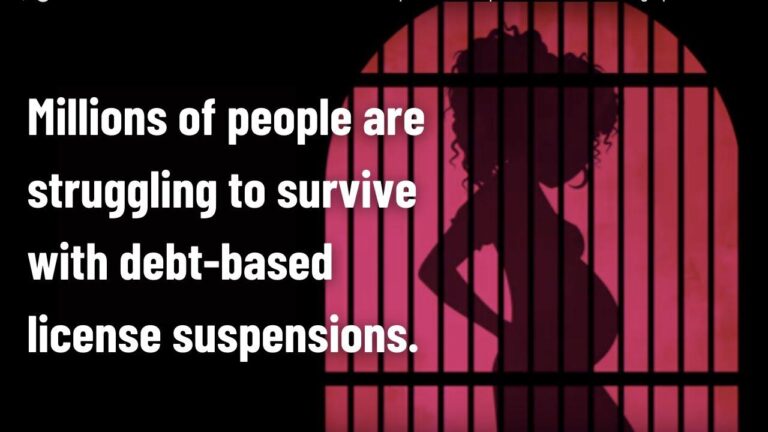City Hall is moving forward with significant reforms aimed at ending the widespread practice of suspending driver’s licenses due to unpaid debt. The proposed changes, which have gained momentum among local lawmakers, seek to shift the focus from punitive measures to more equitable solutions that address financial hardship without compromising public safety. Advocates argue that the current system disproportionately impacts low-income residents and exacerbates economic instability, while supporters of the reform hope it will lead to fairer outcomes and reduce barriers to employment and daily life. As the debate continues, the initiative represents a growing trend nationwide to rethink how debt enforcement intersects with driving privileges.
Table of Contents
- Debt-Based License Suspension Reform Gains Momentum in City Council Discussions
- Impact on Low-Income Residents and Driving Access Explored by Advocates
- Proposed Alternatives to Suspension Include Payment Plans and Community Service
- City Officials Urge Swift Legislative Action to Prevent Unnecessary Penalties
- Closing Remarks
Debt-Based License Suspension Reform Gains Momentum in City Council Discussions
City council members are increasingly rallying behind significant changes to the current policy that allows driver’s licenses to be suspended due to outstanding debt. Advocates argue that the practice disproportionately impacts low-income residents, creating a cycle of financial hardship and limited mobility. The proposed reform aims to establish clearer guidelines that prioritize public safety over punitive debt collection, ensuring that individuals maintain their ability to commute for work, school, and healthcare access.
Key components of the reform under discussion include:
- Eliminating license suspensions for non-driving related debts, such as unpaid fines or fees unrelated to traffic violations.
- Implementing alternative repayment programs that offer flexible options based on income levels.
- Introducing judicial oversight before suspension actions are taken, to account for individual circumstances.
City officials emphasize that these changes could significantly reduce administrative costs and enhance community safety by keeping more drivers legally on the road.
Impact on Low-Income Residents and Driving Access Explored by Advocates
Advocates emphasize that revoking driver’s licenses due to unpaid debts disproportionately affects low-income residents, who often rely on driving as an essential means to sustain employment and access vital services. Community organizations argue that the current system perpetuates cycles of poverty by limiting economic mobility for those already facing financial hardship. The inability to legally drive frequently results in job loss, missed medical appointments, and reduced opportunities for families to improve their circumstances.
Supporters of reform highlight several key concerns that should guide policy changes:
- Equity in enforcement to ensure that suspension policies do not unduly penalize those unable to pay fines immediately.
- Access to payment plans and alternatives that accommodate different financial situations without risking essential driving privileges.
- Community-based support services to help residents navigate the legal and financial challenges associated with debt-based suspensions.
By addressing these issues, advocates believe that reforms can reduce unnecessary barriers, fostering safer roads and more stable lives for economically vulnerable populations.
Proposed Alternatives to Suspension Include Payment Plans and Community Service
City legislators are introducing innovative measures aimed at easing the financial burden on those at risk of losing their driving privileges due to unpaid debts. Instead of the traditional route of suspension, officials are advocating for flexible payment plans that allow individuals to manage outstanding balances in affordable installments. This approach not only helps maintain access to transportation but also supports repayment without the added stress of an immediate lump sum. Additionally, it minimizes the economic ripple effects caused by license suspensions, such as job loss and increased court backlogs.
Alongside payment options, community service is being positioned as a viable alternative that fosters civic engagement while addressing financial obligations. Participants can earn credits toward their debts by contributing hours to local projects, thereby creating a constructive pathway out of suspension without resorting to punitive measures. Such reforms have garnered support from advocacy groups emphasizing fairness, and could set a precedent for municipalities around the country seeking to modernize their approach to license enforcement.
City Officials Urge Swift Legislative Action to Prevent Unnecessary Penalties
City officials have voiced strong support for legislative measures designed to overhaul the current system of license suspensions tied to unpaid debts. They emphasize that the existing process often leads to disproportionate penalties for residents who are unable to immediately settle their financial obligations, resulting in unnecessary hardships and hindering their ability to maintain employment and mobility. The proposed reforms aim to introduce a more balanced approach by ensuring that license suspensions are used only as a last resort, after alternative avenues for debt resolution have been exhausted.
Key points highlighted by the authorities include:
- Preventing excessive punishment: Encouraging the state legislature to enact clear guidelines that avoid broad suspension mandates.
- Enhancing fairness: Ensuring equitable treatment for individuals of varying income levels, so penalties do not disproportionately affect low-income populations.
- Supporting economic participation: Allowing affected individuals to maintain their ability to work and support their families while resolving debts.
Closing Remarks
As the city moves closer to implementing debt-based license suspension reforms, stakeholders from both sides of the issue continue to weigh in on the potential impacts. Advocates argue the changes will promote fairer treatment and prevent undue hardship on low-income residents, while critics caution about enforcement challenges and public safety concerns. With the city council poised to vote in the coming weeks, all eyes remain fixed on how this pivotal policy shift will shape the future of license regulation and debt collection at City Hall.

